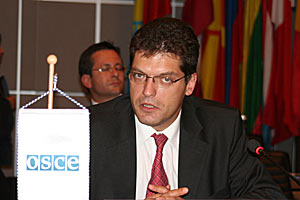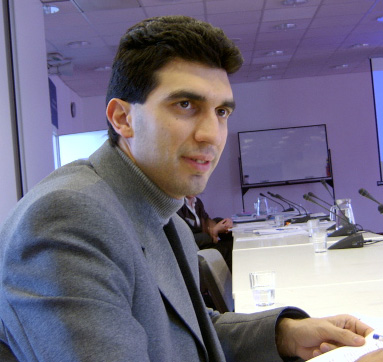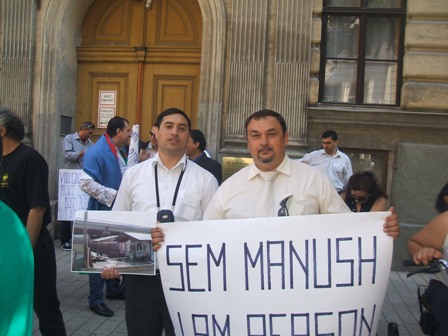11.07.2008OSCE Supplementary Human Dimensions Meeting on Sustainable Policies for Roma and Sinti Integration
 The OSCE (Organization for Security and Cooperation in Europe) participating states should step up their efforts to end widespread discrimination against Roma and Sinti. The OSCE Action Plan on Roma and Sinti as well as the National Roma Strategies are good "milestones" for promoting integration. But "much more implementation work" is needed to bring genuine improvements down to the local Roma communities in areas such as education, housing and health care. The participating states should invest efforts and budget in this engaging regional and municipal authorities as well as civil society organizations and Roma community as equal partners in Roma integration process.
The OSCE (Organization for Security and Cooperation in Europe) participating states should step up their efforts to end widespread discrimination against Roma and Sinti. The OSCE Action Plan on Roma and Sinti as well as the National Roma Strategies are good "milestones" for promoting integration. But "much more implementation work" is needed to bring genuine improvements down to the local Roma communities in areas such as education, housing and health care. The participating states should invest efforts and budget in this engaging regional and municipal authorities as well as civil society organizations and Roma community as equal partners in Roma integration process.
These were some of the main massages of the Supplementary Human Dimensions Meeting on Sustainable Policies for Roma and Sinti Integration that took place on
"All too often, states develop policy initiatives at the national level, without ensuring commensurate impact at the regional and local level within the targeted communities," said Ambassador Janez Lenarcic, the ODIHR Director. He added that the exclusion and discrimination of Roma has negative repercussions on societies as a whole. Sarita Friman-Korpela, Secretary-General of the Finnish Advisory Board and Representative of the Finnish Chairmanship, underlined that improving the situation of Roma is above all a human rights concern. She insisted that participating states should invest more in implementing the OSCE Plan for Roma and Sinti and their National Strategies for Roma Integration.
The Roma organizations took active position in all discussions. During a special Roundtable for Civil Society organized prior to the main Human Dimensions Meeting they prepared a joint statement to call participating states, OSCE and EU to improve policies (and especially their implementation) with regard to facilitating equal access of Roma and Sinti to public services (see information below). On Jun e 11 they also organized a demonstration against the ethnic profiling of Roma in
Roundtable for Civil Society
More than 40 representatives of national and international Roma NGOs took part in Roundtable for Civil Society organized on
The Statement was drafted by Andrzej Mirga and Dan Dolgi from OSCE Contact Point on Roma and Sinti. Deyan Kolev (Chairman of Center “Amalipe”) also took active part in its preparation. He suggested several points that were included in the Statement: the requirement to the OSCE participating state to fund their Strategies for Roma integration from the national budgets, to dedicate significant administrative resources for Roma integration, to provide Roma public councils with proper competences (profile) for decision-making, etc. (points 23, 25, 28 and 29 from the Joint statement). The Statement also incorporated trough several points the suggestion of Deyan Kolev that national institutions should provide standards for Roma integration, financial support to municipalities for fulfilling these standards and monitoring mechanisms how municipalities meet the national standards. In this way municipal authorities (together with Roma NGOs) will play crucial role in choosing and implementing actions for Roma integration according to their local specifics (points 31, 32, 33 and 34).
The Joint statement from Civil Society Roundtable could be downloaded here
Roma demonstration “Stop ethnic profiling!”
All representatives of Roma organizations who attended OSCE Human Dimensions Meeting took part in a demonstration march on July 11 in order to express their solidarity with the Roma in
The Roma demonstrated before the EU Fundamental Rights Agency. Their representatives Ashmed Elezovski and Isabela Mihalache were officially accepted by FRA Director and Management Board. During the meeting FRA officials agreed with the Roma representatives that the situation with ethnic profiling of Roma in
Questions raised by Bulgarian representatives
During the OSCE Human Dimensions Meeting and the side events Bulgarian representatives raised questions and shared experience regarding Roma integration in
Radostin Manov, representative of “Diverse and Equal” Foundation –
 Deyan Kolev from Center “Amalipe” raised questions about the impact on Roma educational integration of the educational reform initiated in January 2008. According to him the way the delegated school budgets and the principle “money follow the student” are applied now will deteriorate significantly the educational level of Roma community and will disturb the Roma educational integration. With concrete examples he proved that the number of Roma drop-outs will double from the next school year, that the educational level of the village schools will decrease significantly, that most of the teachers in the so-called “focal-point school” do not have experience and knowledge how to work with Roma children and that intercultural education will be almost abolished because of the shortage of the so-called “free-elective classes” in almost all schools. “This is not because the reform is bad but because it is implemented in a way that does not take into account the necessity of educational integration and the specific efforts and investment for it. Our Ministry of Education has Strategy for Educational Integration but it is just a piece of paper: it is not mainstreamed in the general documents issued by the same Ministry and the reform does not take this Strategy into account” – said Kolev. He proposed incorporation of component “integration of Roma students” in the formula for defining the delegated school budget as well as establishing National Program for Support of Intercultural Education that will finance “free-elective classes” out of the delegated budgets.
Deyan Kolev from Center “Amalipe” raised questions about the impact on Roma educational integration of the educational reform initiated in January 2008. According to him the way the delegated school budgets and the principle “money follow the student” are applied now will deteriorate significantly the educational level of Roma community and will disturb the Roma educational integration. With concrete examples he proved that the number of Roma drop-outs will double from the next school year, that the educational level of the village schools will decrease significantly, that most of the teachers in the so-called “focal-point school” do not have experience and knowledge how to work with Roma children and that intercultural education will be almost abolished because of the shortage of the so-called “free-elective classes” in almost all schools. “This is not because the reform is bad but because it is implemented in a way that does not take into account the necessity of educational integration and the specific efforts and investment for it. Our Ministry of Education has Strategy for Educational Integration but it is just a piece of paper: it is not mainstreamed in the general documents issued by the same Ministry and the reform does not take this Strategy into account” – said Kolev. He proposed incorporation of component “integration of Roma students” in the formula for defining the delegated school budget as well as establishing National Program for Support of Intercultural Education that will finance “free-elective classes” out of the delegated budgets.
George Krastev from Ethnic and Demographic Issues Directorate presented the process of preparation of updated version of the Framework Program for Roma Integration. He stressed that Roma NGOs are active part in this process. Speaking about the desegregation in education he insisted that this process is positive but it is not “universal solution” since there are many places in which it is inapplicable.
As Chairman of ERIO Ivan Ivanov, Roma activist from









